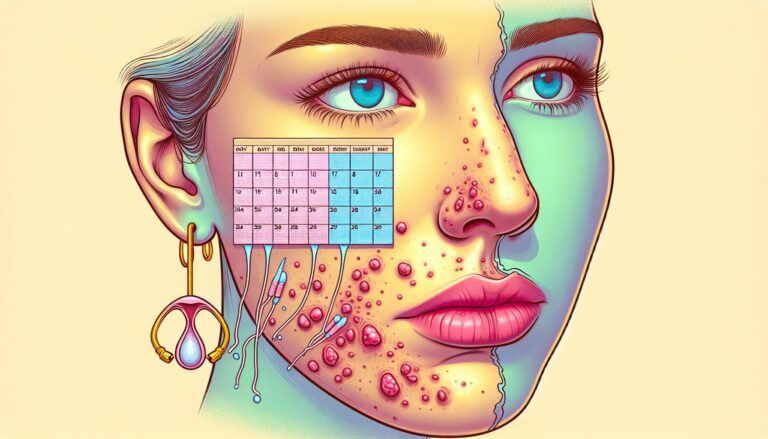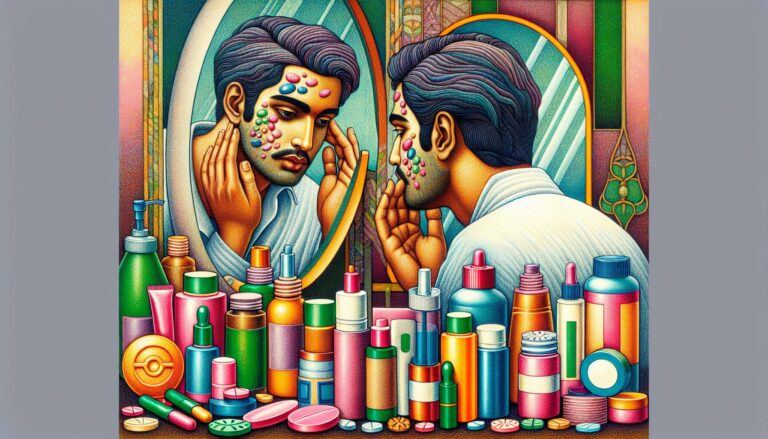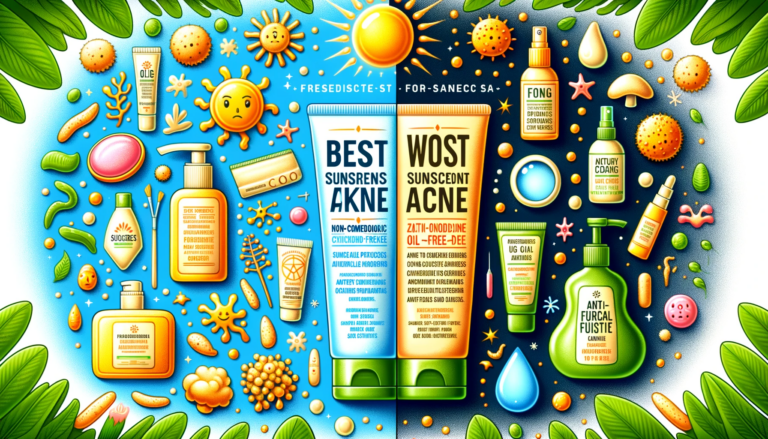Does Melatonin Cause Acne?
Pondering if your nightly melatonin supplement could be the unexpected guest behind those acne flare-ups?
As the sleep aid of choice for many seeking restful nights, the surge in melatonin’s popularity brings with it a wave of questions about potential side effects, including its impact on skin health.
Well, we’ll be going over:
- What makes melatonin a popular choice for those struggling with sleep?
- How might melatonin interact with your skin, potentially influencing acne?
- What does current research say about the link between melatonin and acne?
Let’s dive in.

The Popularity of Melatonin as a Sleep Supplement
In recent years, melatonin has skyrocketed in popularity as a natural sleep aid. You’ve likely seen it on pharmacy shelves or maybe even in your social media feed, touted for its ability to promote restful sleep. Melatonin, a hormone your body produces in response to darkness, helps regulate your sleep-wake cycle. Its synthetic form is used in supplements to help those struggling with sleep disturbances.
The appeal of melatonin supplements lies in their perceived safety and natural origins. Unlike some prescription sleep medications, melatonin doesn’t come with a high risk of dependency or a laundry list of potential side effects. This makes it a go-to choice for those looking to improve their sleep quality without heavy pharmaceuticals.
Moreover, the ease of access to melatonin supplements adds to their popularity. Available over-the-counter in various forms – from pills to gummies – melatonin offers a straightforward solution for insomnia and other sleep-related issues. Whether it’s jet lag or stress-induced sleep disturbances, a melatonin supplement can help realign your body’s natural sleep rhythm, ensuring a more restful night.
Link Between Melatonin and Acne
When you’re trying to balance clear skin and healthy sleep patterns, understanding the interaction between melatonin and acne is crucial. Although melatonin is renowned for its sleep-promoting benefits, its impact on skin health, particularly acne, has sparked curiosity and concern among users.
Research on the direct link between melatonin and acne is still evolving, leaving room for debate and further study. Some studies suggest that melatonin’s influence on hormonal balance could potentially trigger or exacerbate acne in sensitive individuals. Conversely, others argue that melatonin’s antioxidant properties might actually benefit skin health and reduce acne severity by combatting oxidative stress — a known aggravator of acne.
It’s also essential to consider other factors that might contribute to acne when taking melatonin, such as stress levels, dietary habits, and overall skincare routine. These elements, combined with individual biology, make the connection between melatonin and acne complex and highly personal.
Melatonin’s Effects on Skin Health
Delving deeper into the connection between melatonin and your skin, it’s crucial to understand how this hormone operates beyond its role in regulating sleep. Melatonin possesses antioxidant properties that can be beneficial for skin health, potentially protecting the skin from oxidative damage. This damage is often a precursor to signs of aging and can exacerbate acne problems by inflaming the skin further.
However, the story doesn’t end here. Melatonin’s interaction with your body’s hormonal balance is a double-edged sword. For some, its impact on hormones could trigger or worsen acne outbreaks, particularly in sensitive individuals. It’s a balance game where melatonin’s skin-protective benefits might be overshadowed by its ability to disturb hormonal equilibrium, leading to increased sebum production and subsequently, acne.
It’s also worth noting the indirect effects. Poor sleep quality itself can amplify stress levels, which, in turn, can increase cortisol production. This spike in cortisol may lead to higher sebum production, indirectly linking melatonin’s primary role in sleep regulation to acne development. This suggests a complex and multifaceted relationship between melatonin and skin health, heavily influenced by individual factors like stress management, dietary habits, and overall lifestyle.
Research on Melatonin and Acne
Recent studies delve into the complex relationship between melatonin supplementation and acne, revealing varied outcomes. While there’s no definitive answer yet, the insights gathered shed light on potential connections. For instance, a segment of research highlights how melatonin’s antioxidant properties might help mitigate skin damage from environmental stressors, potentially reducing acne flare-ups. However, it’s crucial to understand that these benefits can vary widely among individuals.
Another crucial aspect under investigation is melatonin’s influence on hormonal fluctuations. Since hormones play a pivotal role in acne development, any supplement affecting hormonal levels, including melatonin, warrants a closer examination. Preliminary findings suggest that while melatonin may benefit overall skin health for some, it could inadvertently trigger acne in others due to its impact on hormonal balance.
The dialogue between sleep patterns and acne severity also garners attention. Poor sleep quality is known to elevate stress, subsequently increasing cortisol levels. This spike in cortisol can boost sebum production, a direct contributor to acne. Since melatonin aims to improve sleep quality, its indirect effects on acne through stress reduction and hormonal regulation are areas of continued research.
Understanding the nuanced interactions between melatonin, sleep, skin health, and hormones remains essential. Each individual’s response to melatonin can differ, influenced by their unique physiological makeup and existing health conditions.
Conclusion
Navigating the complex relationship between melatonin and acne shows there’s no one-size-fits-all answer. While the antioxidant benefits of melatonin may support skin health for some, its potential to disrupt hormonal balance could lead to acne in others.
It’s clear that individual responses to melatonin vary, influenced by personal health profiles and sleep patterns. If you’re considering melatonin for better sleep or skin health, it’s wise to monitor your skin’s reaction and consult with a healthcare professional to tailor advice to your specific needs.
Remember, achieving a balance is key in leveraging melatonin’s benefits without compromising your skin health.






